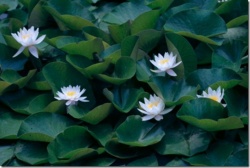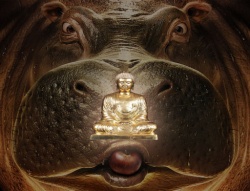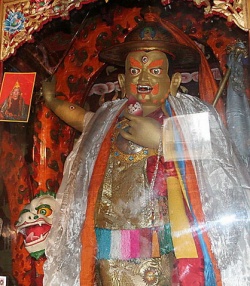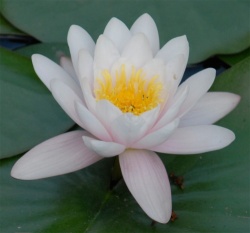Ashin Upagote's Birth and becoming into an Arahat
Once, when Buddha was residing at the Jetavana Monastery, in the early morning the Buddha took Ananda with him for the round of alms in the city of Rajagaha.
On the way they met a rich man's son called Viwadathi who was playing with some friends in the street. On seeing the Buddha, Viwadathi generously offered some cake to the Buddha.
Buddha smiled and accepted the cake and placed it in his alms bowl.
Ananda then asked Buddha why he was smiling.
The Buddha then explained to Ananda his insights into Viwadathi's past, present and future.
The Buddha said that in 200 years time Viwadathi will become an Arahat.
He will defeat the great evil "Mara" in battle. During the same period an esteemed King called Asoka will install my relics inside stupas so that everyone can pay homage.
The Mara will appear at the homage ceremony intending to spoil the proceedings.
To prevent this from happening an Arahat called Upagote will appear.
He will fight the Mara and be victorious.
Then the Buddha told Ananda how Upagote was born and was given his name.
200 years after the Buddha's paranibbana at a village not far from the city of Rajagaha a fisherman caught a big fish in his net.
The fisherman, noticing the enormous size of the fish, carefully opened its stomach and miraculously found a baby girl.
Wanting to receive some kind of reward for this amazing find gave the baby girl to the King.
The King was overwhelmed by the girl's stunning beauty and adopted her and rewarded the fisherman.
The King gave her the name of Misadevi. Although Misadevi was very beautiful she also had a very repulsive odor.
The Buddha explained to Ananda that the reason why she smelt so badly was because her negative kamma in her previous life.
Her smell was so foul that even the King could no longer bear being in her presence.
Reluctantly he decided to abandon her and placed her on a raft and launched it into the river.
The raft drifted down stream from place to place. However, because of her foul smell, no one wanted her to remain.
Finally the raft beached on a spot close to where a hermit called Upa lived. Upa welcomed her as though she was his own daughter and looked after her with loving-kindness.
Gradually the Misadevi's foul smelling odors ceased.
Shortly after this transformation Upa and Misadevi became husband and wife.
Not long afterwards Misadevi conceived and gave birth to a baby boy they named Upagote.
The hermit Upa had a special insight into the boy Upagote's future.
Upa somehow knew that Upagote would one day be King. Realizing this he returned with Misadevi and Upagote and presented them both to the King.
The King was delighted to see Misadevi again and was pleased that Upagote would one day succeed him as the King of Rajagaha. However Upagote's mother Misadevi disagreed with the King as she wanted him to be an ascetic.
Whilst the King and Misadevi were arguing about the Upagote's future a Deva appeared in the sky.
The Deva raised Upagote into the sky.
At that moment Upagote's spontaneously became aware of the true nature of impermanence and attained ultimate wisdom and was transformed into an Arahat.
The Deva, realizing what had happened, let Upagote go and, because he had attained Arhatship with supernatural powers, he flew whilst still meditating unaided through the sky.
Upagote looked down from the sky at the wide ocean and suddenly in the middle of the ocean an enormous palace made of brass emerged.
This brass palace, Upagote realized, was his new abode.
It was to be the abode of an Arahat. Upagote knew that his all his good kamma had suddenly ripened.
King Asoka offers alms to the young novice Nigrodha
Prior to King Asoka's conversion to Buddhism he followed the royal custom of feeding the Brahmin priests.
The King was rather displeased with the Brahmins demeanor at meal times.
The King saw that they were neither clean nor calm. One day the King thought to himself "Charity on such a lavish scale should be better given in proper quarters".
A few days later the King noticed a serene looking young novice called Nigrodha quietly walking in the street.
This so impressed him that the King invited the Nigrodha to the palace.
Once in the palace the King asked Nigrodha where he would like to be seated. Nigrodha immediately chose the King's own throne and promptly sat on it.
Unfazed, the King served the young novice an excellent meal.
After meal was completed the King requested that the Nigrodha deliver an exposition of the same doctrine his own teacher used to give.
The young novice then delivered an instructive discourse of the Dhammapada: "Heedfulness is the path to deathlessness. Heedlessness is the path to death.
The heedful do not die.
The heedless are like unto death".
King Asoka converts to Buddhism
The word of Buddha awoke the King's spirit and he became a staunched supporter of Buddhism.
King Asoka built a great monastery which he called the Asokarma Monastery.
One day, during an assembly of Bhikkus he asked them the number of discourses Buddha had left them.
The Bhikkus replied saying that the Buddha had left them 84,000 discourses.
King Asoka then said that to honor the Buddha he would build 84,000 pagodas (Stupas).
After the Buddha relics were found they were enshrined in each of the 84,000 pagodas.
It was decided to celebrate this achievement by holding a special ceremony to which the whole Kingdom would attend.
In order to protect the ceremony against negative powers created by the Mara the King requested the presence of many Bhikkhus.
The powers of the Mara were capable of spoiling the ceremony so the Bhikkus searched amongst their number for an Arahat to help them.
In the southern ocean the Bhikkus discovered Ashin Upagote and invited him to the Asokarma Monastery.
When Upagote arrived at the monastery the King invited him for a meal.
To test the power of Upagote, the king released an elephant to attack Upagote.
Ashin Upagote convinced the king of his power by turning the elephant to stone by only using a single hand.
Upagote's victory over the Mara
King Asoka decreed that the entire kingdom should participate in the celebrations to pay homage to the Buddha relics and their coming enshrinement into the 84,000 pagodas.
Knowing the kingdom was holding these celebrations, the Mara of the paramitta vasavatideva descended to the human world and attacked the kingdom by creating a violent thunderstorm.
Upagote easily managed to redirect this storm away from the celebrations.
Following this the Mara used hail stones which Upagote also managed to overcome.
The Mara next simultaneously used use of all of its weapons, which again were effectively dealt with by Upagote.
In desperation the Mara then used a series of different transformations to attack those gathered at the celebrations.
These ranged from a raging bull to a fierce lion.
After these strategies failed the Mara shape shifted into the form of a Naga which directly attacked Upagote.
Upagote defeated the Naga by transforming himself into a Garuda which was able to overcome the Naga.
Finally the Mara was defeated by Upagote hanging the body of a rotten dead dog around its neck.
King Asoka at the end of the celebration paid tribute to Upagote by asking him to accept the king's offer of benefactor.
After the completion of the homage ceremony Upagote left the Askarama Monastery and returned to the palace of brass in the southern part of the ocean.
To this day throughout Myanmar whenever there is any sign of threat of extreme weather spoiling a celebration the people invoke the help of Upagote for protection.
The invocation of Upagote takes the form of offerings.
Those people living in Myanmar who live by the sea and are vulnerable to vagaries of the ocean, frequently use this practice of offerings to Upagote to ensure their own protection.




